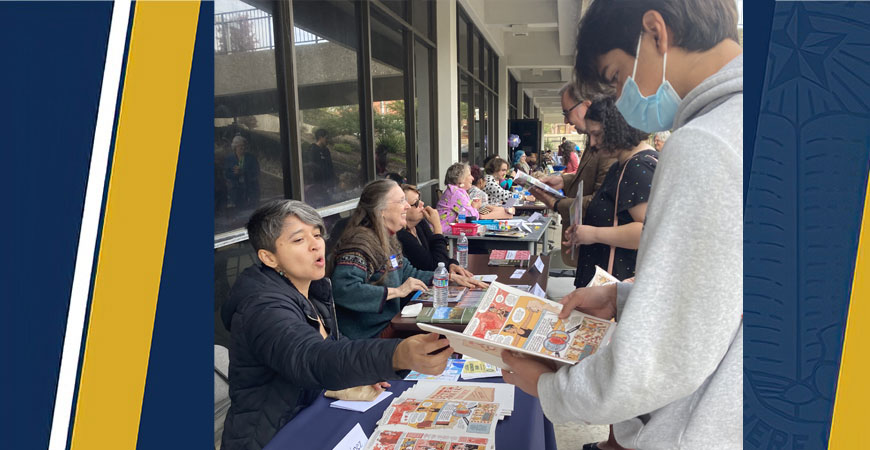
UC Merced has received a $750,000 boost to its mission to invest in the San Joaquin Valley’s unique cultural, creative and linguistic wealth by working with the region’s people to strengthen communities and champion social justice.
The university’s Center for the Humanities will use a three-year Mellon Foundation grant to expand its established partnerships with communities. The grant supports the Public Humanities Design Studio, a laboratory space on campus that sustains faculty, staff, graduate students and community members collaborating on humanities projects.
The design studio is a place to break loose from virtual labs and offices, gather and apply the study of values, culture and the human spirit to tasks such as consultation, content development and training.
The Mellon funding, which went into effect Aug. 1, will support two faculty members and eight graduate students per summer to work on community-engaged humanities projects that emphasize social justice and the future of UC Merced and the region it serves. The funding will support community lunch meetings, an annual “boot camp” about public humanities, book club discussions, a symposium and a speaker series.
The Mellon Foundation is the nation’s largest supporter of the arts and humanities, guided by a core belief that these are essential to human understanding. The foundation seeks to help build communities enriched by meaning and empowered by critical thinking.
“This grant is intended to help the university and the broader community imagine the kind of futures we want,” said Christina Lux , managing director of the Center for the Humanities. “We are coming at it from the humanities angle, with disciplines such as history, literature and philosophy. We want the community to talk to us and work alongside us.”
This grant is intended to help the university and the broader community imagine the kind of futures we want, We are coming at it from the humanities angle, with disciplines such as history, literature and philosophy.
Lux is the project’s principal investigator. Co-PIs are Vice Provost and Dean of Graduate Education Hrant Hratchian, anthropology Professor Robin DeLugan , who directs the Resource Center for Community-Engaged Scholarship, and Latin American literature Professor Ignacio López-Calvo .
The university’s application for the Mellon grant notes that the Valley’s linguistic and cultural diversity can be one of its greatest strengths and a driver of innovation. Cultural wealth can be found, for example, in the embroidery of an Afghan woman’s wedding dress, in the ribbons worn by Folklorico dancers or in digital images that preserve the designs of Indigenous basket weavers. Such touchstones can preserve history and culture even when social structures, law or scholarship fall short.
As a Hispanic-serving institution purposefully built in a historically underserved region, UC Merced is duty-bound to help its neighbors address issues such as climate impacts, homelessness and insufficient or inaccessible health care, Lux said. Understanding and overcoming these and other problems can benefit from being viewed through a social justice lens, she said. The Mellon-funded project will also resonate with new majors, such as environmental humanities.
DeLugan agreed. “The project advances earlier efforts to focus UC Merced research on our region,” she said. “In particular, it will demonstrate the role of public humanities for building community connections.”
Some key partners are the university’s Graduate Division , its Resource Center for Community-Engaged Scholarship and the Merced County Library, which will work with the Center on a community-wide “common read” and associated book club discussions.
The goal of the three-year project is a sustainable network of public humanities projects built from a succession of summer cohorts of faculty, graduate students and community members. The projects will lean on local knowledge wedded to university resources. There will be discussion groups, idea exchanges and showcases for humanities project ideas.
“Studying people’s literature and language teaches you how they tell stories and communicate,” Lux said. “They often imagine solutions for their communities through literature, long before looking for it through, say, science or engineering. Because first, you have to imagine it.”
The project has a special resonance for Lux, who spent her early childhood years living with her family in the rural Merced County community of Planada. In 2013, she left a staff position at the University of Kansas to return to the Valley via UC Merced, becoming assistant director of the humanities center. She was appointed managing director in 2021.
“I have roots here,” Lux said, “and it was important to me come and help build the university.”

